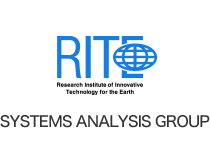Project for international cooperation on the analysis and assessment of technologies for climate change mitigation (ALPS III; FY2017-FY2021)
ALPS Project(ALternative Pathways toward Sustainable development and climate stabilization)
Background and objective
As global warming is bound to have severe impacts on the whole planet, there are high expectations for solutions to this issue. However, while global warming affects various sectors in every country of the world, its impacts are not uniform. Mitigation measures and associated costs that countries can afford to take and pay may differ to very large extent. A comprehensive policy package is thus needed to allow truly effective climate mitigation implementation on a global scale.
The Paris Agreement that was adopted at the twenty-first session of the Conference of the Parties (COP21) in Paris at the end of 2015, came into force in November 2016. COP26 was held in Glasgow, UK, one year later than originally scheduled due to COVID-19 pandemic. The rules related to the market mechanism regarding Article 6 of the Agreement, which had not been resolved, was agreed upon and the Paris rulebook was finally completed. In June 2019, the Japanese government developed a "long-term strategy as a growth strategy based on the Paris Agreement," in which it "aims to achieve net zero emissions as early as possible in the second half of the 21st century. In October 2020, Prime Minister Suga declared in his policy speech that he would "aim to achieve a carbon-neutral, decarbonized society by 2050. In December 2020, the Ministry of Economy, Trade and Industry (METI) took initiative in formulating the "Green Growth Strategy". Many countries and regions around the world have pledged to be carbon neutral by 2050, and the world is entering an era in which addressing global warming is seen as an opportunity for economic growth. China and India have also announced that they aim to achieve net zero emissions by 2060 and 2070, respectively. With the transition from the Trump administration to the Biden administration in January 2021, the United States returned to the Paris Agreement and hosted a climate summit in April 2021, urging countries to dig deeper into their 2030 emission reduction targets. Responding to this, the Japanese government strengthened its greenhouse gas emission reduction target for 2030 from a 26% reduction compared to the FY2013 level to a 46% reduction, and then possibly to a 50% reduction in April 2021. The 2030 target has been strengthened, especially in developed countries. In this way, the movement toward ambitious emission reductions is accelerated in Japan and abroad. In October 2021, the Cabinet approved the Sixth Basic Energy Plan, as well as the Global Warming Prevention Plan and the Long-Term Strategy as a growth strategy based on the Paris Agreement.
On the other hand, COP26, held in Glasgow, UK in November 2021, did not result in the agreement that the UN and the UK government had expected. Although the international community is generally aware of the need to strengthen climate actions, there is still a large gap in terms of specific measures among countries. The Intergovernmental Panel on Climate Change (IPCC) is to provide the latest scientific knowledge on climate change in the Sixth Assessment Report and other documents. In this context, it is becoming even more important to comprehensively consider the situation of each country, region, and industry, as well as to conduct various assessments and analyses that can contribute to the formulation of climate policies.
This project assesses mitigation and adaptation measures, climate finance and climate policy in a consistent and comprehensive manner, taking into account the latest scientific knowledge on the subject, recent trends in international negotiations, and cooperating with international research organizations. Our goal is to contribute to the development of an international framework and of a national strategy under which economic growth and climate measures would be compatible (green growth), creating "a virtuous cycle between environment and growth" in the long-term strategy.

